Information/Write-up
Joni's third album overflows with remarkable images - "The thirty-third floor in the air"; "With your father's gun alone"; "The face of the conquered moon" - but one looms over all the others. It is the line in "Woodstock" that describes jet bombers "turning into butterflies above our nation". Rarely has both the terror and the idealism of the late 1960s been so powerfully wrought, the competing forces of the times so perfectly evoked. The image spoke to a nation and a generation, but it also holds a metaphorical significance for the 26-year-old woman who wrote and sang it. Ladies Of The Canyon is the sound of Mitchell cracking out of her chrysalis and starting to soar.
With Clouds, Mitchell had forged a productive niche. She was by now a rising star, firm friends with James Taylor, Carole King and the rest of that golden set forever associated with boom time in laid-back Laurel Canyon. She could easily have followed many of her contemporaries in pursuing that distinctive sound and sensibility for the foreseeable future. Instead, she was gripped by a restless urge to change and move forward. She talked about wanting her records to become more complex, more sophisticated, for them to draw from a wider palette of colours. Implicit in this was a clear desire to let the music, rather than just her voice and her words, carry a greater weight of meaning. She was not content to allow her work to be merely pretty or simply clever. It had to have guts, too.
Ladies Of The Canyon is, mostly, the record on which Mitchell delivers on all of those ambitions, although in some ways it remains a transitional album. While more decorated than Clouds, it is still relatively sparse- half the tracks feature just Mitchell's voice with her own solo instrumental accompaniment. Strings, additional vocals and horns are subtly deployed, but as a rough rule of thumb, it's whenever she chooses the piano as her primary conduit of expression that things start to get really interesting. The way her voice colludes with the instrument brings out astonishing new tonal shades, while her increased proficiency offers not just an increased range of textures, but a new way into her music. On songs such as "Willy", her love-struck hymn to Graham Nash, the music follows the whims of the heart. It ebbs and flows, with its own internal logic, unbound by any formal structure, her accompaniment subtly changing with each new line.
There are times when Ladies Of The Canyon goes so deep it becomes almost daunting to follow. The mysterious "Blue Boy" is a sad, strange and highly stylised tale of the impossibility of love, while "The Priest" is dense with a heavy symbolism. Mitchell picks out a John Fahey-like acoustic blues figure in a minor key, and there are echoes too of the early work of another former lover, Leonard Cohen, in the song's druggy undertow and its thick waves of imagery.
While Mitchell spends most of her time on Ladies Of The Canyon casting a line into deep, dark waters, a handful of tracks are content to paddle in more familiar streams. Revisiting the upstanding folk of her previous work, "Morning Morgantown" is almost indecently pretty, a storybook portrait of idealised smalltown life. All bright smiles, "coloured rings" and "tea and lemonade", it's not quite the sole occasion on which the album veers towards tweeness. Already recorded by Buffy Sainte-Marie and Tom Rush, "The Circle Game" traces the cycle of life, as a young boy becomes a man. Time is a carousel of "painted ponies", and the world promises "dragonflies", "cartwheels" and "falling stars". "The Circle Game" provides the album with a satisfyingly upbeat singalong ending, but its well-ordered craft and sweetness have more in common with what has come before than what lies ahead.
Likewise, the rather prim title track finds Mitchell at her most austere and her voice at its most bell-like, as though in conscious imitation ofJoan Baez. Introducing us to the titular ladies of Laurel Canyon - Trina, Annie and Estrella - she celebrates a wellspring of female creativity that manifests itself in a variety of forms. Whether making clothes, baking brownies, singing songs or rearing cats and children, they are all "pouring sunshine down the canyon". It's a well-meaning portrait of sisterhood and arty Los Angeles life that- if it didn't already- would soon sound like a parody.
Such moments of prettiness risk appearing rather tame next to the riches on offer elsewhere on one of Mitchell's landmark albums, but the contrast between the light and the shade ultimately makes for a beautifully rounded record. And in any case, these sugary songs provide us with a kind of farewell. She would rarely, if ever, sound so relatively uncomplicated, so sunny, again.
-Graeme Thomson, Uncut Magazine 2017
Composed and arranged by Joni Mitchell
Engineered and advised by Henry Lewy
Recorded at A&M Studios, Hollywood, California
Assisted on arrangements for Cello by Don Bagley
Cello played by Teressa Adams
Percussion by Milt Holland
Paul Horn on clarinet and flute
Jim Horn on Baritone Sax
Bop vocal by "The Saskatunes"
Circle Game Chorous by "The Lookout Mountain United Downstairs Choir"
Other vocals, guitar and piano by Joni Mitchell
All music published by Siquomb Pub. Co., 55 Liberty Street, New York, N.Y., 10005
Lyrics copyright by and reprinted with Siquomb's permission
Cover by Joni
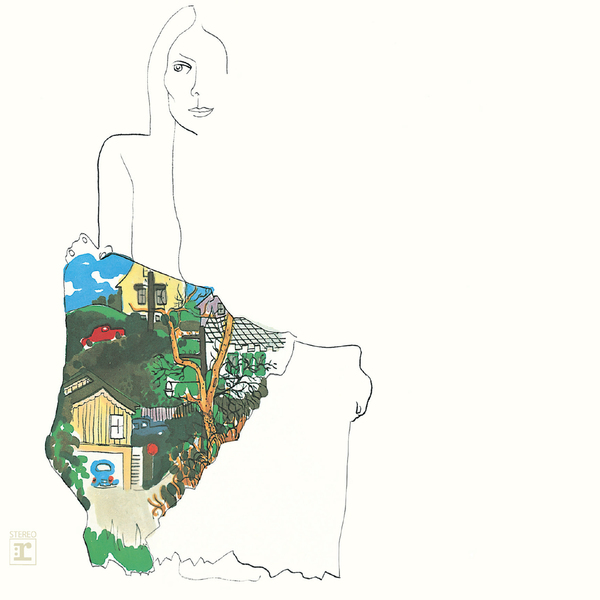
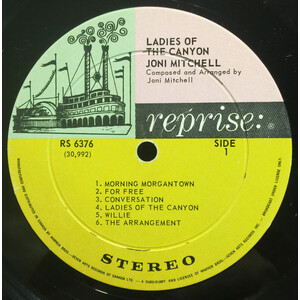
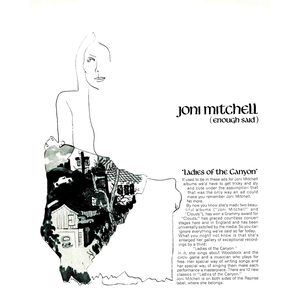
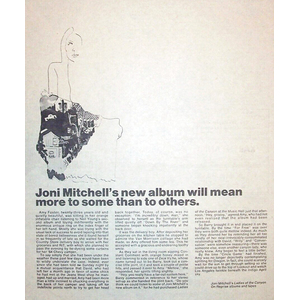
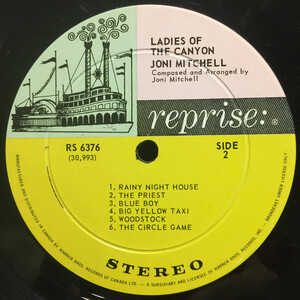
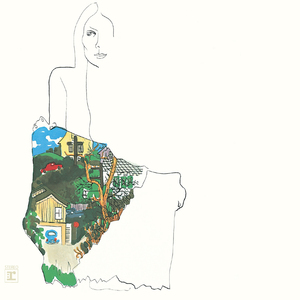
No Comments